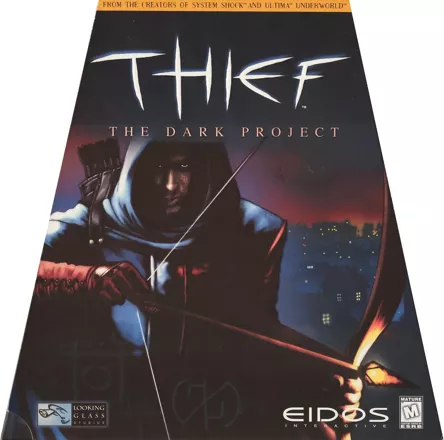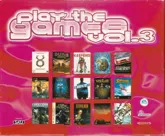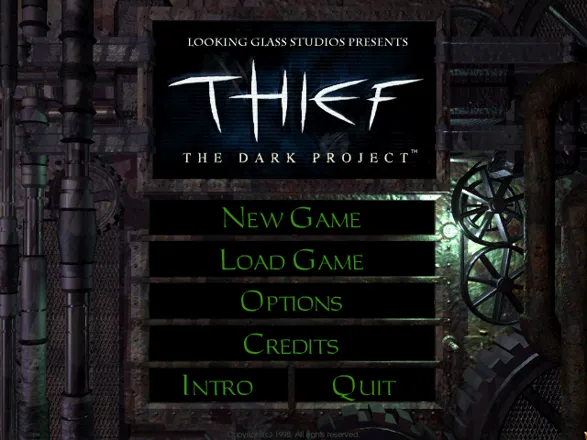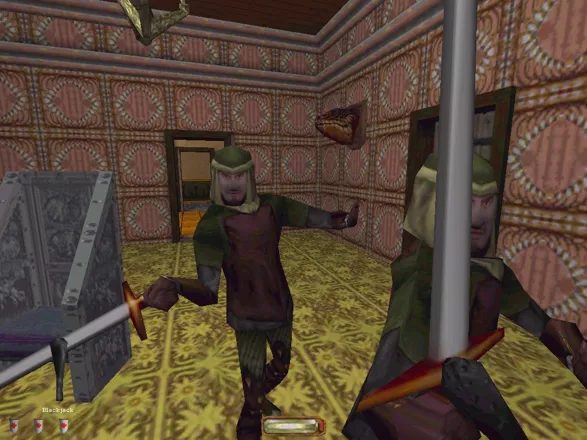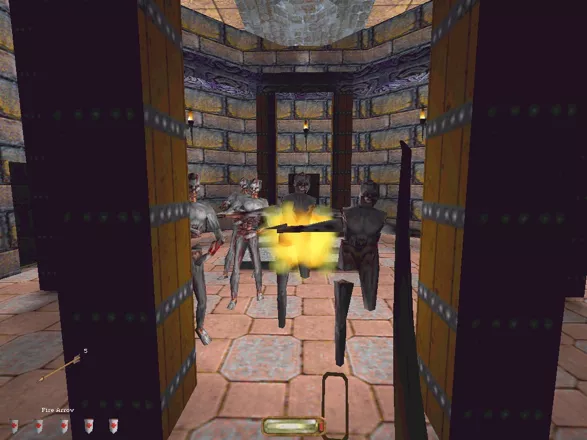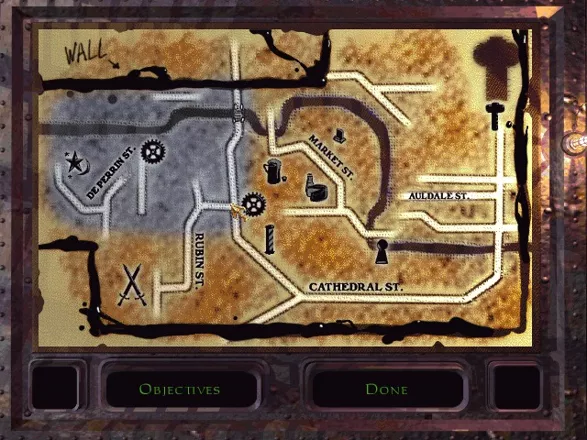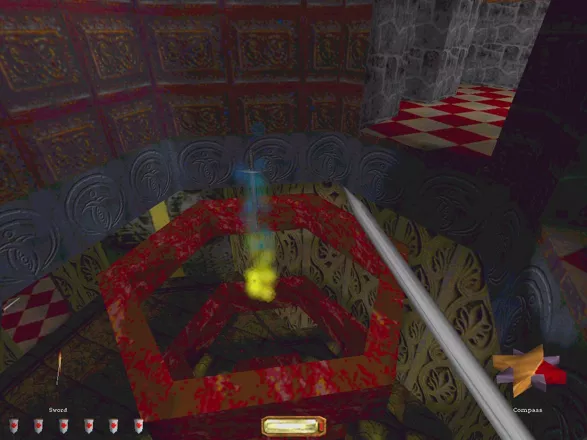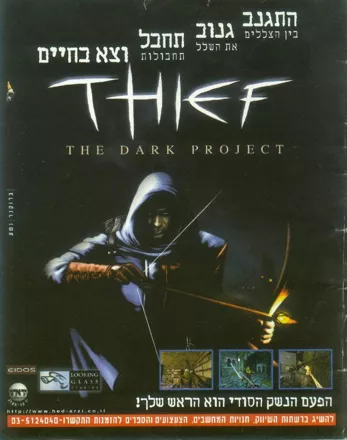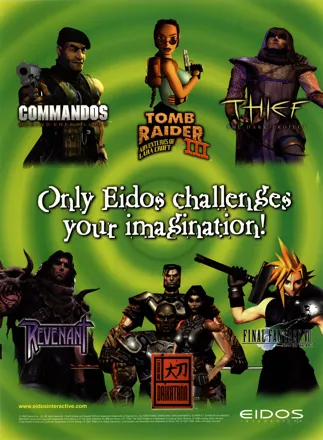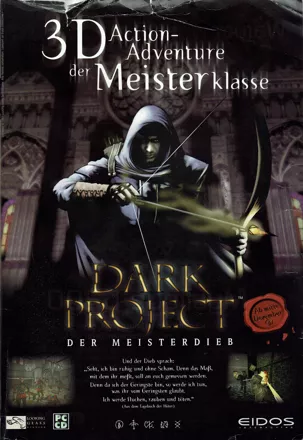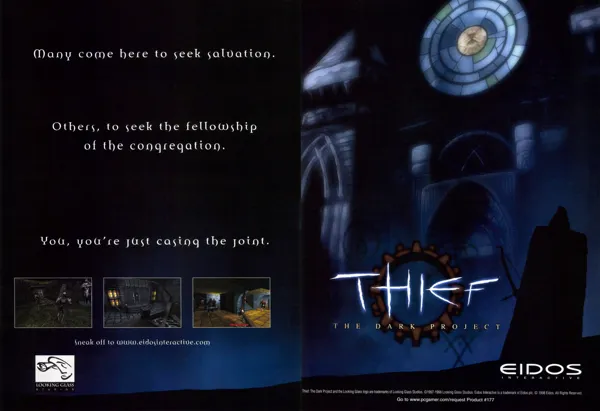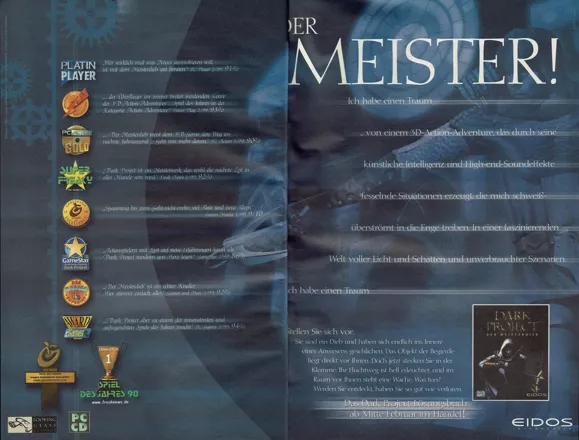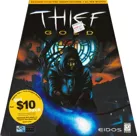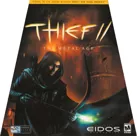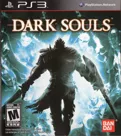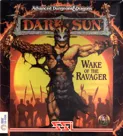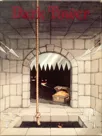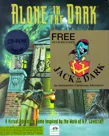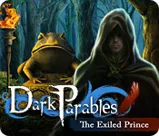Thief: The Dark Project
Description official descriptions
Garrett, discovered on the streets as a beggar, is taken in and trained by the secretive organization known as the Keepers. However, Garrett's plans for his training is different than that of his masters and so Garrett soon parts company. Surfacing as a master thief, Garrett must enter forbidden places and appropriate the treasures of the rich and the powerful. Of course this line of work is offensive to many people including the rich nobles, the town guard and the religious order of the Hammerites. If Garrett can keep his head while he relieves these forces of their valuable trinkets, he should be able to do quite well....
Thief: The Dark Project is a first person game focused on stealth. It is set in a metropolis called "the City", a medieval fantasy world with some elements from the industrial revolution era of technology. Garrett's main skills are in using the shadows to avoid being seen (the level of visibility indicated by a "light gem") and to avoid being heard (different surfaces make different noises). Guards can be alerted by either, and remaining hidden is ever important. Entering combat against armed opponents is not recommended, though some enemies (notably the various undead) can be taken on directly or avoided. It is also possible to silently sneak on guards, incapacitate them with the blackjack, steal their keys, and move their bodies.
At Garrett's disposal is a wide range of equipment, including lockpicks, a blackjack, a sword, flash bombs, holy water, explosive mines, and a bow which fires normal arrows in addition to water, fire, moss, rope, and noisemaker arrows. Each type of arrows has a unique purpose: water extinguishes torches, moss covers the ground to soften the sounds of footsteps, ropes can be used to climb in certain spots or cross chasms, etc.
The levels in the game are fairly open, and most of the time there are several paths and ways to accomplish the objective. Certain objects can be interacted with, moved from place to place, or destroyed. The game has three difficulty levels distinguished by the amount of goals needed to fulfill. Lower difficulty levels may allow the player to skip some of the harder areas due to the lack of a mission objective leading there. On higher difficulties, additional requirements (such as completely non-lethal way of finishing a stage) may be added. Loot gained from Garrett's thieving can be used to purchase additional equipment for the mission ahead.
Spellings
- 神偷 - Simplified Chinese spelling
Groups +
- 3D Engine: Dark Engine
- Game feature: In-game screenshot capture
- Gameplay feature: Body dragging
- Gameplay feature: Drowning
- Gameplay feature: Lock picking
- Gameplay feature: Pickpocketing
- Games with downloadable official map/level editors
- Green Pepper releases
- Setting: Church / Monastery
- Theme: Zombies
- Thief series
Screenshots
Promos
Videos
Add Trailer or Gameplay Video +1 point
See any errors or missing info for this game?
You can submit a correction, contribute trivia, add to a game group, add a related site or alternate title.
Credits (Windows version)
144 People (125 developers, 19 thanks) · View all
| Project Leader | |
| Lead Programmer | |
| Additional Programming |
|
| Lead Artist | |
| Lead Designer | |
| Himself | |
| Programmers | |
| Renderer | |
| Hardware Rendering and D3D Support | |
| Designers | |
| [ full credits ] | |
Reviews
Critics
Average score: 91% (based on 35 ratings)
Players
Average score: 4.1 out of 5 (based on 176 ratings with 15 reviews)
Meet Garrett, he steals from the rich and gives it... to himself!
The Good
Ten years ago, I found Thief: The Dark Project lying in my local game store for a mere 5 Euros. I remember my fourteen old self being very impressed by the term the game uses to describe its gameplay. First Person Sneaker. Yup, before Thief, yours truly only knew about the First Person Shooter. I always thought games in first person were limited to this: go from point A to point B, gear up on weapons and go kill everything in your way! But since 2004, after having the pleasure of plunging through System Shock and Thief, I finally knew that First Person can be a lot more than just Shooter. And now, I still am very grateful to have stumbled upon these two games.
But enough about that little origin story. Thief takes place in a rather unique setting as it mixes medieval architecture with Victorian age technology as well as a healthy dose of magic and supernatural elements. A world filled with darkness and danger where the rich and powerful hide inside their huge villas and castles to avoid beggars, diseases and thieves like you.
You are Garrett, a thief who steals from the rich in order to prevent his ribs from meeting his spine. He is also one of the most badass video game characters I have ever seen in the wonderful medium of video games. For one, he takes on every job he can get his hands on. Nothing worth of value is safe from him, no matter if it's located in a mansion, a factory or in haunted catacombs. He steals from everyone and everything without any fear or regret, including criminal kingpins, religious fanatics, the undead and even under the divine nose of A FUCKING GOD!!!
That's right! Garrett doesn't even sheer away from stealing from deities and not only does he get away with it, but the theft even leads to the death of said god. Eat your god killing heart out, Kratos!!
Thief, like virtually every other game set in first person released in that era, is a level based game where you have total freedom of where you want to go. In order to complete the level, you have a series of objectives (primarily steal a specific object or meet a certain person) with higher difficulties giving you more and tougher objectives. Such as collecting more loot or killing no humans. Locations include city streets, mansions and more haunted places like a deserted town and mines filled with zombies, ghosts and other nasty beings.
The game puts an extremely strong emphasis on stealth and for one perfect reason. You're Garrett, a thief! No John Rambo, Gandalf or Ezio Auditore Di Firenze. Although Garrett has a sword and knows how to use it, he can only take two or three blows from a blade before going to thieves' heaven. It is vital to be patient and to remain in the shadows, avoiding all full frontal contact with enemies as most of them are stronger, faster and deadlier than you. If they suspect you to be in the area, they will search every corner and cranny for you, turning their heads all the time and keeping their weapons ready. And if they find you, they will run after you like crazy and causing other guards to join for dinner with you serving as the main course! Your only chance of survival? RUN! Run your ass off and pray to the gods that you will find a hiding spot in time and pray even more that they have lost track of you! And in case you do manage to sufficiently damage a guard (damn, lucky you!) he will run for back up.
One of the aspects I love the most about Thief: The Dark Project is its level design. Every level is huge and has lots of secrets and the attention to detail is astonishing. Walk through the first level's mansion and hear guards chat about trivial stuff like bear fights, the closure of a prison or other plain gossip. Enter the kitchen, steal the freshly made bread and apples (and eat them for health) and read a complaint from the butler about the food's quality. Does it matter to you or the game's plot? No, but it does add a lot in creating a deep, engaging world that is a true joy to explore. You also have a map, but unlike in most other games. The map is just a still image with the part of the map you are now in highlighted in blue. This is a great idea in my opinion, since it forces you to orientate and remember your surroundings rather than just relying on all fully detailed map as in most games.
Another aspect in which Thief shines, is in its atmosphere. The music and sound effects are phenomenal and give the game a dark, brooding and at times very unsettling feel. The music is very ambient, slow and can be ether relaxing and soothing or dark and threatening. In addition, you better keep your ears wide open for incoming footsteps and humming knights standing guard. You know, the last time I felt that sense of danger and tension was when playing DOOM during my childhood. When you go through all these dark and dangerous places, you cannot help but feel that you have just entered a place you are not supposed to be. You constantly feel on edge, wondering if that particular door in front of you either contains loot or a ferocious guard, ready to cut you in half!
As mentioned earlier, sound plays a vital part in this game. As it allows you to eavesdrop on conversations and to listen to the footsteps of nearby security. But be careful, as sound can be as great a foe to you as it is a friend. Not every surface you will walk over is a grassy lawn or a soft carpet. Run over marble or steel and you will make as much noise as Lemmy from Motörhead makes while playing Ace of Spades! Yes, they will hear you coming from the other side of the god damn planet.
So in order to be as discreet as possible, Garrett has a nice arsenal of equipment such as a blackjack and a bow with various types of arrows. These include traditional steel tipped arrows, water arrows to extinguish torches, moss arrows to soften all hard and noisy surfaces and noise arrows for distracting enemies. Between missions, you can use the loot from your previous adventure in order to buy all these fancy tools. However, you only have a limited budget to spend so you better think ahead. No try before you buy!
The Bad
I found that the game's level design tends to become more sluggish as the game moves on. Maybe it is because supernatural elements begin to take over when you have gone past the first half of the game. Replacing earthly settings with dungeons and plant filled caves and switching human guards with ratmen, swarms of flies and other fantasy stuff. I personally think that a game called Thief should involve more traditional thieving. Or to tell it in Garrett's own words: "break into a guarded mansion, steal a fat nobleman's priceless treasure and leave quietly."
The following point is not a bad thing per se, but keep in mind that this is a whole different ball game than you may be used to from first person games. It is not a fast-paced shooter or a dungeon crawling RPG. It is a stealth game where patience, meticulous planning and perfect timing is essential in order to fully enjoy this game. If you managed to adapt your play style to this genre, you will certainly enjoy Thief as it is meant to be!
The Bottom Line
While Thief The Dark Project is my least favorite entry in the Thief series, it still remains a magnificent game well worth trying out. Especially if you want to get an original take on the first person genre or just want an intriguing, intense experience. But honestly, Thief is something that has to be played to be believed. And if you enjoyed it, then do yourself a favor and go play its sequels! Well, my fellow taffers, this is my final review for this year. I wish you all a merry Christmas and a happy, prosperous 2015. We will meet again next year!
Windows · by Stijn Daneels (79) · 2014
Slow and steady... keeps you alive.
The Good
Thief puts you the shoes (though you can never see them) of Garrett. He's a cynical guy, and all he wants to do is earn enough to keep himself alive... and well off. Set in an industrially developing world, there is this medievel meets modernization atmosphere. It makes for some very interesting sneaking.
And sneak you will. Garret isn't exactly built to be in GQ (Guardsmen's Quatrerly). You DO have a sword, in case you get caught, but you will seldom survive two such encounters. Thus you rely on your trusty blackjack and bow. The blackjack comes in very handily for getting rid of that guard that keeps roaming the halls. One shot to the back of the head is all it takes. Of course you have to get behind him without giving yourself away. Should you want to dispatch them from a distance, the bow is very useful. Or, should you not want to kill anyone (which is mandatory in the harder settings), you can shoot an arrow into the corner over there. The guard will investigate the sound, leaving you to sneak past him.
You can also get several useful arrows that have nothing to do with killing. The moss arrow can carpet a noisy floor so you can cross unheard. The noisemaker arrow does a better job of distracting your enemies than a simple broadhead. The rope arrow can get you to higher ground. And water arrows can extinguish those pesky torches.
Sound plays an important part in this game, as it can (and usually does) save your life. You can hear guards walking the halls so you can avoid them, or even pick up bits of information if you catch some of a conversation. This is the thinking man's Quake.
The Bad
Thief can be very difficult, even on the easiest setting. Charging into a room blindly makes for a lot of reloads. Even if you are careful, there are many mistakes that can be made.
The Bottom Line
If you are tired of running around shooting at anything that moves, you should try this game. You will still be afraid of things moving in the shadows (though most of the time it will be you), and now you have to be afraid of things you hear in the shadows as well, but this gives the game the appropriate atmosphere. Happy Filching.
Windows · by Narf! (132) · 2000
The Good
Stealth has been an obscure, odd gameplay mechanic before Thief arrived and made it mainstream. Sure, there were stealth games, such as the groundbreaking yet nearly impossible Castle Wolfenstein or the interesting, yet arcadish and gimmicky Metal Gear. But nobody thought of making realistic stealth the core of gameplay, especially not in a first-person 3D game.
Thief is therefore a descendant of Ultima Underworld games and System Shock - revolutionary 3D games that used the capabilities of the engine to create immersive worlds and varied gameplay rather than focus on fast-paced action. Like those games, Thief is a masterpiece of game design, an essential link in an evolutionary chain that gave us some of the most advanced and beloved games of all times.
Thief is not just the first game to introduce full-fledged stealth-based gameplay in a 3D environment: it is the game that does it best. Its gameplay is so well-constructed that somebody out of touch with the history of video games would have sworn that its concept has been used countless times before and only perfected in Thief. In reality, it is one of those very rare games that deliver a new concept and a flawless execution of it right away.
The sneaking in Thief just feels right. Thanks to the generous level design, you never feel forced to do things a certain way. Yes, it is advisable to stay unnoticed, but you are not required to do so. You can incapacitate guards or simply try to avoid them. You can hit them with your blackjack and then hide their unconscious bodies. You can also try to take them on in direct sword combat, but be warned: even one-on-one fights are very tough, as they should be in a game where violence is the last resort. Most importantly, even with its strict concept, the game never feels rigid: you have freedom, you can dictate the pace. No solution is obvious, but none is obtuse. You can and should be creative, but even the hardest tasks are not frustrating because the game feels what you want from it, it is synchronized with your playing without being over-indulgent or artificial. That is something only very few games could pull off, and is one of the greatest achievements of Thief.
Your arsenal of tools is varied and impressive. The clever usage of the bow is one of the game's trademark inventions. Basically, your bow can act as a regular weapon in some cases, but it can also contribute to stealth. It is too bright in the hallway? Extinguish a torch with a water arrow from afar. Can't move silently on the pavement? Cover it with moss by shooting a special arrow. Feel the need to set something on fire? The appropriate arrows are at your service. There are also bombs and other cool little gadgets, as well as your trusty sword if things get too hairy. You can also grab, re-arrange, and throw different objects to distract enemies or for other purposes.
The game follows the fantastic GoldenEye concept of difficulty levels: the higher it is, the more objectives you need to complete in order to pass. This actually encourages you to play on higher difficulties to experience the game in a more complete form, and also means that playing on the lowest difficulty is by no means too easy: it is just less complicated. Also, a really cool touch is money management: you don't receive a salary or any awards based on your performance - you simply steal stuff which is then converted into money once the stage is finished. This further compels you to explore every corner of the stage in search of shiny golden things.
Level design is perhaps the most crucial element in game creation, and that's why the best game designers pay so much attention to it. Thief has a stellar level design that is seamlessly and masterfully interwoven with the demands of the gameplay and plays a key role in the creation of the game world. In other words, it is an integral part of the entire experience rather than just one well-made element. To illustrate, the secret areas in old first-person shooters were fun, but you could enjoy the game without them. System Shock, on the other hand, was built around exploration; it would lose most of its significance if it were linear.
Thief doesn't have a huge interconnected world like that game, but each and every level is an impeccably designed large area that creates the illusion of being in a real world while at the same time directly serving gameplay purposes. That is, it's not just about a vast environment with optional locations, but it's also not about conveniently placed passages that are there simply as an excuse to use yet another trinket. Such is the genius of level design here that you never feel you are "in a game", yet everything has its use precisely for game-related activities. There is so much thought and care put into designing those levels that even simple shooting gameplay set in them would elevate the game above the masses.
Equisite details make us forget the merely adequate 3D engine: Thief is gorgeous and will always stay so, because art always triumphs over technological limitations. Despite the uniformity of the setting, the levels are refreshingly varied: interiors of a lavishly decorate mansion, a desolate underground prison, mysterious catacombs, nostalgically beckoning stone-paved streets of a quiet medieval town, horrifying otherwordly realm - each location is unique, and you'll want to explore it again after you have finished the stage. Detail is everywhere, and you'll find yourself standing in empty rooms just to notice everything the designers have created.
No wonder that this results in an incredibly atmospheric experience. Thief is among the most magically atmospheric games ever made, perhaps on par with System Shock in that respect. The setting perfectly captures the cozily haunting "vibe" of the Middle Ages, and the touch of industrialization gives it its own peculiar flavor. It is "gothic" meets "steampunk": two of the most attractive visual genres are united in one game. You won't forget this world once you see a glimpse of it. It has little to do with supernatural elements: the stages with monsters are actually less absorbing than urban areas. Particularly the interior locations are masterfully done. And let's not forget the impeccable sound effects that are vital to gameplay as well as enhancing the atmosphere.
Far from being just a "thief simulator", Thief is a plot-driven game with a cohesive setting, based primarily on mission objectives as dictated by the story. While being somewhat in the shadows (much like the protagonist himself), the plot, evolving in stylish cutscenes, is interesting to follow to the end. Overhearing conversations and reading occasional documents helps establish the tone of the story even better. Thief also boasts a unique world with its own background information, organizations, religious beliefs, and so on.
The Bad
Most games that single-handedly define a certain concept are repetitive. Thief is no exception. It didn't use stealth as a harmless gimmick, as yet another option for flexible gameplay: it focused on it as seriously and as adamantly as possible. If Doom could get tiresome with monotonous shooting, Thief could get equally tiresome with monotonous sneaking. You'll have to avoid enemies and try to stay unnoticed pretty much for the duration of the entire game. The tension is constant, and there is no relief. You never get powerful - that's not what the game is about. But it is also counter-intuitive to our most basic instinct. Thief courageously and ingeniously opposed our primeval violent urges, but the abstinence becomes almost unbearable. It is therefore best played in short sessions, savored in small doses like a delicious, exotic meal.
Thief can also get quite hard, even on lower difficulty levels. Quicksave-abusing is not uncommon when you repeatedly try to pass a tough section and fail. Particularly hard are levels with undead enemies, which are perhaps the game's weakest link. It is fun to shoot zombies with holy water arrows when you first meet them, but after a while you realize that simply running past them is a better solution. If they really wanted to give us a break from sneaking (which I would welcome) they should have made those enemies much easier to defeat.
The Bottom Line
Thief is much more than a seminal 3D stealth game that popularized a gameplay element everyone have been inserting in their games ever since. It is also, miraculously, a nearly perfect incarnation of its revolutionary concept that few managed to imitate, and none have surpassed. But most importantly, it is a magnificent piece of game design for all players, a genre-crossing beauty with fantastic levels, deep gameplay, and haunting atmosphere. It is an essential classic proudly standing in the stellar row of the medium's highest achievements.
Windows · by Unicorn Lynx (181775) · 2014
Discussion
| Subject | By | Date |
|---|---|---|
| Duality | hribek (28) | Mar 24, 2009 |
| What can/ could You take away (add?) | hribek (28) | Mar 22, 2009 |
| Garrett on steroids | hribek (28) | Mar 22, 2009 |
| Garret looks like Nicholas Cage? | hribek (28) | Mar 13, 2009 |
Trivia
1001 Video Games
Thief: The Dark Project appears in the book 1001 Video Games You Must Play Before You Die by General Editor Tony Mott.
Basketball
Like other Looking Glass games like System Shock and System Shock 2, this game also contains a hidden basketball court. (See Tips & Tricks for details on accessing it.)
Development
Originally, Thief was to be a game called Dark Camelot where Merlin was a time-traveler but it eventually became Thief... before that it was a game involving Communist zombies!
Editor
Thief fans requested the level editor, so Looking Glass Studios released DromEd (subsequently included on the Thief (Gold) and Thief II disks), there are now hundreds of fan missions available for download.
Hammerites
"The Hammer of Light" in the game are a group of religious warrior/knights, similar to the Knights Templar during the height of their power in Europe
Inspiration
Members of the design team have said that books by Umberto Eco (The Name of the Rose among others) were a big inspiration for the atmosphere and setting of the game.
Taffer
According to an interview made by the now defunct PC accelerator to project designer Steve Pearsall the word "Taffer", which many fans went to great lengths to define as some sort of long-lost "olden" word, was actually created by level designer Laura Baldwin. It was originally meant to be some sort of slang for common criminal but it evolved from that point on.
Thievery
There is a group of people working on a free Thief inspired conversion for Unreal Tournament. It can be accessed it from http://www.thieveryut.com.
Awards
- Computer Gaming World
- April 1999 (Issue #177) – Runner-up as Best Action Game of the Year
- GameSpy
- 2001 – #40 Top Game of All Time
- GameStar (Germany)
- Issue 12/1999 - #45 in the "100 Most Important PC Games of the Nineties" ranking
- Issue 03/2000 - Most Innovative Game in 1999
- Issue 12/2008 - One of the "10 Coolest Levels" (For "The Sword". It uses the player's expectations against him - instead of the usual quick burglary, it sends him on a horror trip which manages to wear out Garret's earned self-confidence.)
- PC Gamer
- April 2000 - #27 in the "All-Time Top 50 Games Poll" (tied with Tribes)
- PC Player (Germany)
- Issue 01/2000 - Best 3D Stealth Game in 1999
- Power Play
- Issue 02/1999 – Best Action-Adventure in 1998
Information also contributed by Jack Lightbeard, Neon Hammerite, PCGamer77, Scott Monster; WildKards and Zovni
Analytics
Upgrade to MobyPro to view research rankings!
Related Sites +
-
The Circle of Stone and Shadow
A huge fan network dedicated to the Thief Series. Including everything from user-crafted levels to fan fiction. If it is Thief-related, odds are that you'll find it here. -
Thief: The Dark Project
Official Website
Identifiers +
Contribute
Are you familiar with this game? Help document and preserve this entry in video game history! If your contribution is approved, you will earn points and be credited as a contributor.
Contributors to this Entry
Game added by robotriot.
Additional contributors: Trixter, blade51, Zovni, Indra was here, Rantanplan, Shoddyan, sfabien, Jack Lightbeard, Havoc Crow, Ms. Tea, Kidofthecentury, Patrick Bregger, FatherJack.
Game added November 1, 1999. Last modified March 27, 2024.
